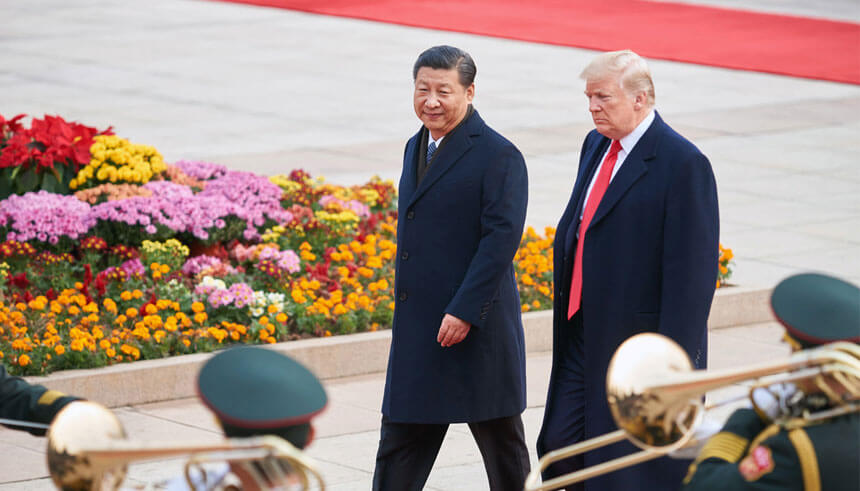US-Asia Business
US-China Market Watch: Trade War, Hollywood-China, Apple Sales
By Angela Bao

Your monthly roundup of the latest US-China business and industry news.
China makes some trade concessions to U.S.
United States and Chinese officials will meet in Beijing for follow-up trade talks in the second week of January, preceding higher-level talks scheduled for February. After returning from the G20 summit in Argentina, President Trump had stated that United States Trade Representative Robert Lighthizer, with the help of trade advisor Peter Navarro, would be in charge of the negotiations. The New York Times reports that Lighthizer is pushing for substantial changes from China, such as the elimination of forced technology transfers. Lighthizer, who has spent 40 years working with China, is expected to be tough on trade negotiations and wants China to capitulate.
China has made several trade concessions since the G20 summit. On January 1, China lowered import tariffs on over 700 products, in an attempt to cut costs to consumers. China also agreed to temporarily reduce auto tariffs on American-made cars to 15 percent and to suspend the 5 percent tariff on 67 other auto parts. China has recently agreed to a second large purchase of U.S. soybeans. Chinese state-owned companies made their first substantial purchase of American soybeans, over 500,000 tons valued at about $180 million, since China placed a 25 percent retaliatory tariff on the product. However, Reuters reports that the tariffs on soybeans remain intact, which limits the interest from private soybean importers.
China approves more Hollywood film releases
To help reach its box office goals, China ramped up Hollywood movie approvals until as late as the last week of December. The propaganda department wanted to reach at least 60 billion yuan in ticket sales (the equivalent of about US$8.7 billion). That means foreign film imports could be bumped up to 41 this year, up from the standard 34. Bloomberg suggests that the increase implies that Hollywood-China deals won’t be a target if the U.S.-China trade war escalates.
China’s box office growth slowed to 9 percent in 2018, down from the 13.5 percent growth reported for 2017. Despite the slowdown, 2018 was a banner year for domestically produced Chinese films, which made up over 62 percent of the year’s total ticket sales—up significantly from 53.8 percent in 2017. Deadline attributes China’s year-end increase of Hollywood film imports to their desire to boost box office numbers.
Apple sales slump in China, signaling slowing Chinese economy
Apple announced that it was cutting revenue expectations for the first time in 16 years, due to slowing iPhone sales in China. The surprising announcement signals that China’s economy “is in serious trouble.” In a letter to investors, Apple CEO Tim Cook partially attributed the decline in sales to rising trade tensions between the United States and China, and its impact on the Chinese economy.
Apple had some other setbacks in China. A Chinese court banned the sale and import of most Apple iPhone models, except the latest models, iPhone XS, iPhone XS Plus and iPhone XR. The court granted American microchip maker Qualcomm preliminary injunctions against Apple. Qualcomm, which used to supply Apple with modem chips, claims that Apple violated two of its patents on some of Apple’s older iPhone models. Apple responded by saying that they would push out an iOS update to Chinese consumers, since the patents were supposedly only pertinent on older operating systems. Apple continues to sell all iPhone models in China, which Qualcomm maintains still violates the court order. Qualcomm also posted bonds worth around $1.5 billion to block the sale of some iPhone models in Germany.
Qualcomm has deep ties in China. It was a major supplier of semiconductors to Chinese telecommunications company ZTE, which was banned in the United States. Qualcomm’s planned acquisition of Netherlands-based NXP Semiconductors ended after it failed to gain approval from the Chinese government.
Boeing opens 737 plant in China
Aircraft manufacturer Boeing opened its first 737 completion plant in Zhoushan, China, as part of its strategic investment against rival Airbus. The company also delivered the first of its 737s that were completed in Zhoushan to Air China. Boeing put $33 million into a joint venture with state-owned Commercial Aircraft Corp of China to take a majority stake in the plant. Boeing forecasts the demand for its aircraft in China to reach $1.2 trillion over the next 20 years.
Boeing and Airbus have been expanding in China, which is on track to overtake the United States as the world’s largest aviation market in the next decade. Airbus had set up a joint venture in 2008 for a final assembly line for its A320 aircraft in Tianjin. China is Airbus’s largest single-country market, and the company recently delivered its 400th A320 Family aircraft in China.
Huawei CFO detained in Canada
The CFO of Chinese telecommunications giant and world’s second-largest smartphone maker Huawei, Meng Wanzhou, was arrested in Canada on behalf of the United States and then released on bail. Meng was accused by the U.S. of helping Huawei cover up violations of Iran sanctions. The U.S. has 60 days from the provisional arrest to provide Canada with a formal extradition request and supporting documents, but has yet to do so.
Meng’s arrest has heightened tensions between the United States and China, as they continue trade negotiations. Chinese officials have condemned the arrest as “lawless, reasonless and ruthless." Previously, the United States had also banned the use of Huawei technology by the U.S. government and government contractors, due to national security concerns. President Trump has said that he would intervene in the Huawei case if it benefits the U.S.-China trade deal.
Sign up for the Reach Further Newsletter
We’ll keep you in the know about the latest US-Asia business news and trends.
Suscríbase al boletín Reach Further
Lo mantendremos informado sobre las últimas noticias y tendencias comerciales entre Estados Unidos y China.

